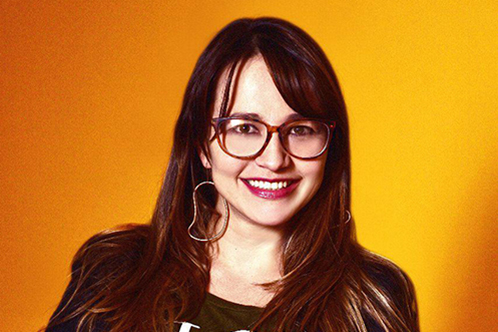In February, before COVID-19 became a pandemic, about 50 people met in Medellin, Colombia to plan how to strategically address the country’s rising obesity rates. During the three-day meeting, María Fernanda “Mafe” Cárdenas, Vital Strategies’ communication manager in Colombia, participated in discussions as usual and gave a presentation. And then, each night, when the other attendees mostly returned to their hotel, Mafe headed out to perform.
The comedy shows she performed at nearby clubs and a theater were just a few of the many hundreds that she has done, including two for Comedy Central, over the past six years. The strategic planning conference also brought together years of progress. “In Colombia, we don’t take hobbies as seriously as people do in the U.S. For example, you know Bill Clinton played the sax, almost professionally, when he was president. For me this meant a lot. I also have a job that I love, and I have this hobby.”
Mafe was raised in Bogotá. Her parents were divorced, and she lived with her mother and grandmother. Her family was religious—Catholic—and this was important to Mafe, who still prays daily, and who feels her religion has driven her to help people. “Helping people,” she says, “is one of my passions.”
As Mafe grew up, she spent a year in the U.S., learning English in California and doing an internship with the Organization of American States in Washington, D.C. In college and in graduate school, she was perennially torn about whether to study theater or to choose a subject more practical and rooted in her desire to help others. Ultimately, she decided to major in political science as an undergraduate in Bogotá.
“I chose it because politics are the only way to change things, to make real changes, through public policy.”
After graduating, she worked for Antanas Mockus, an innovative politician who was Bogota’s mayor and was running for president. He talked about behavior changing through symbols and that caught her attention.
“I began to embrace the idea that people can change their attitude through art and symbolic actions,” Mafe said.
After an intense first working experience, the creative agency that did Mockus’s campaign hired her, and she then went on to own a small TV production house. During one project, she worked for the secretary of mobility in Bogota, where she coordinated a theater group learning about “civic culture” through drama. She was inspired to go to Spain to study theater and traveled around Europe. But she again realized that acting would not be practical as a career.
She returned to Bogotá from Europe and worked for the secretary of education as a communication consultant, and then for four years as the communication director for the office of the mayor in Bogotá. While working for the mayor, she organized an in-house creative agency for the district, which saved the government money and organized all kinds of campaigns, including public health campaigns.
Mafe found her job exciting and fulfilling, but also “life consuming.”
On a dare from a friend, she tried doing stand-up comedy. Mafe was quickly hooked and successful, drawing on material from her work days and grappling with being single.
But while this brought her new joy, Mafe left her job working for the mayor to work for a congressperson, which she was not the right fit. Afterward she took a job reviewing advertisements for the phone company, a job that gave her an appreciation of other people’s work, but which she personally describes as “awful.”
“When I turned 34, I thought, oh my god what am I going to do with my life? I said God, you got to help me. I’m going to be nicer to people. Find me a job: I’m going to do service and I’m going to do it with love and pleasure. I said please, please.”
On the same day as that prayer, a good friend in the mayor’s office called Mafe, and told her about an opening at Vital Strategies and gave her a glowing review.
At Vital Strategies, Mafe has found what she calls her “dream job,” an organization and work arrangement where she feels like she thrives and colleagues who she considers family.
“Being a part of this team and making people aware of this, this is what I’m most proud of, having those campaigns on air. Showing those health problems through the voices of those experiencing them is very different than anything else here.”
Mafe is proud of having ushered nine mass media campaigns to run in five years to promote road safety in Colombia. When working on obesity prevention, Mafe came to personally understand the connection between obesity and the high rates of hunger in her country and she is most satisfied that she has an opportunity to “truly impact people’s lives.”
